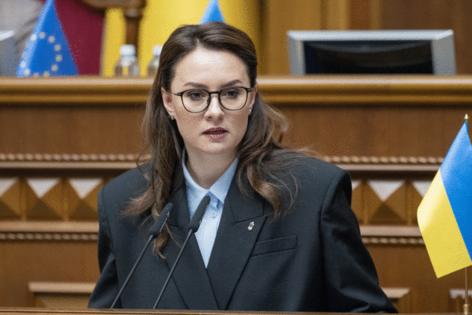Ukraine reshuffles Cabinet with wartime economy struggling
Published in News & Features
Ukrainian President Volodymyr Zelenskyy delivered the biggest government shake-up since Russia’s full-scale invasion as the country faces a pressing need to find more money for its defense following failed diplomatic efforts to end the war.
Deputy Prime Minister and Economy Minister Yulia Svyrydenko was appointed as the new premier in a Cabinet stacked with presidential loyalists, many with experience of working with the administration of U.S. President Donald Trump. Svyrydenko helped broker a landmark minerals deal with Washington earlier this year.
Ukrainian lawmakers approved Svyrydenko’s nomination and will vote on the entire Cabinet overhaul in a vote later on Thursday.
Serhiy Marchenko and Andrii Sybiha were nominated to continue their roles as finance minister and the country’s top diplomat. The reshuffle reflects Ukraine’s effort to increase spending on its war effort and to strengthen — at times — strained relations with Trump administration.
“The two main challenges are weapons and money,” said Volodymyr Fesenko, head of the Penta Research Institute in Kyiv. “How effectively the government can respond to them will largely determine whether we can withstand the Russian invasion next year.”
Trump this week pledged fresh weapons supplies to Kyiv that would be paid for by NATO allies, mainly from Europe. He also threatened harsh economic penalties on Russia if President Vladimir Putin doesn’t end his war within 50 days. The announcement offered hope of stronger support following a series of massive Russian drone and missile strikes on Ukrainian cities.
On Wednesday, Ukraine’s parliament backed a bill amending the 2025 budget to boost defense spending by 412 billion hryvnia ($10 billion) this year. The country faces a $40 billion shortfall to cover social spending, including next year’s salary and pension payments, for which it needs external financing.
Svyrydenko has gained clout from previous work with the U.S., which puts her in a good position to spearhead Ukraine’s drive for more economic support, Fesenko said.
Zelenskyy also proposed Olha Stefanishyna as envoy to the U.S., praising her “successful work” in building ties with Washington in her role as Deputy Prime Minister in charge of European and Euro-Atlantic Integration. Like Svyrydenko, she also worked on the minerals deal with the U.S.
The reshuffle regroups Ukraine’s arms industry under the Defense Ministry, which will now be led by former Prime Minister Denys Shmyhal.
The newly expanded Defense Ministry remit reflects the growing importance of Ukraine’s domestic arms production, which currently covers 40% of what its forces use on the battlefield. While defense procurement budget is around $12 billion, the country’s industry has the capacity to produce military hardware worth three times that amount. But it lacks sufficient funding.
Ukraine’s domestic weapons production must increase to make up 50% of the military’s equipment during the first six months of the new government, Zelenskyy said in a social media post on Wednesday.
Weapons production will remain a key driver of growth, but a major challenge will be to stimulate economic growth in non-military sectors during wartime, said Olena Bilan, chief economist at the Kyiv-based investment bank Dragon Capital.
“I view it positively that technocrats who have proven their effectiveness in previous roles are being promoted,” Bilan said of the government’s reshuffle, pointing to the urgent need to guarantee continued external financing.
---------
—With assistance from Piotr Skolimowski.
©2025 Bloomberg L.P. Visit bloomberg.com. Distributed by Tribune Content Agency, LLC.







Comments